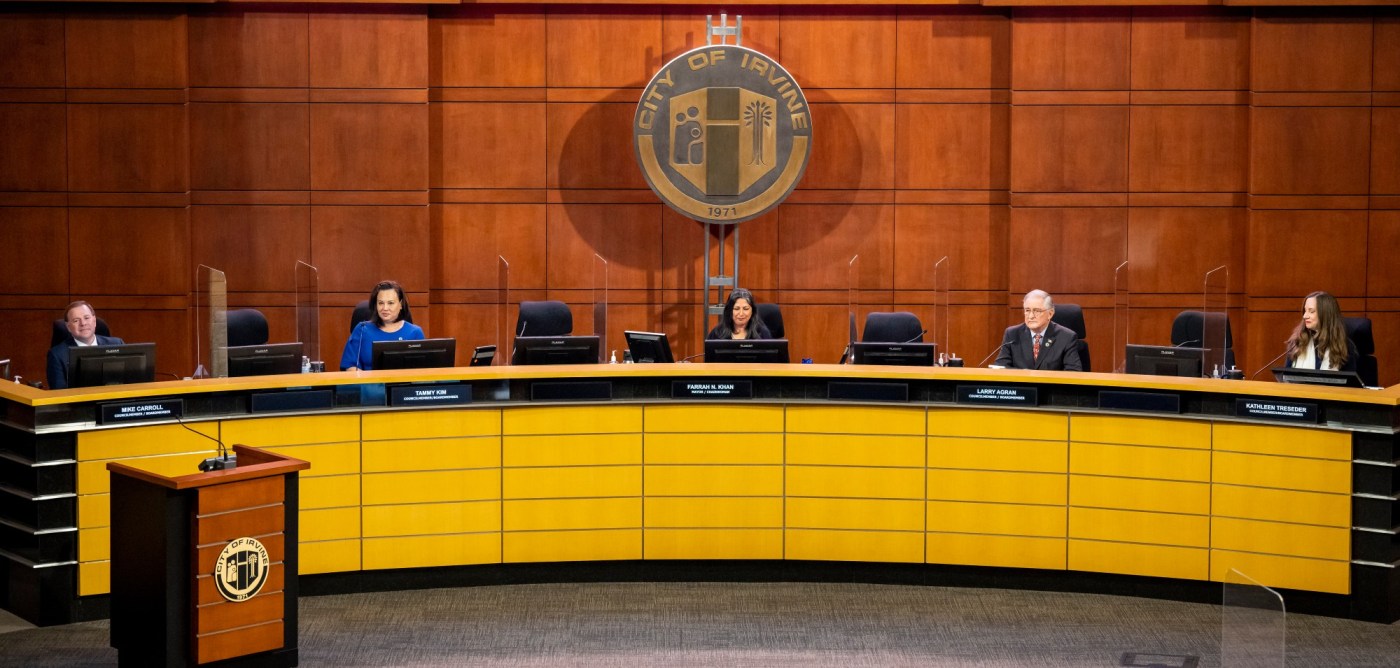Discoveries of a recently released investigation into allegations of corruption in Anaheim have led some in Irvine to sound the call for lobbying reform in their city.
In 60 days, the City Council is expected to deliberate proposals staffers have been asked to generate for strengthening Irvine’s current lobbying rules and their enforcement, as well as examine what lobbying laws other Orange County cities have.
The request to revisit Irvine’s lobbying ordinance was brought by Councilmember Kathleen Treseder, who said she wants to give “more teeth” to the ordinance before serious problems can crop up.
“I’ve been watching Anaheim and what they’re going through,” Treseder said. “I have noticed they’ve had a really tough time, now that the toothpaste is out of the tube, trying to go back and make fixes.”
The $1.5 million city-commissioned probe into alleged corruption in Anaheim was a reaction to the 2022 revelation of FBI investigations that included allegations a self-described “cabal” of business and political leaders had exerted significant influence in its City Hall.
Irvine is named nearly a dozen times in the 353-page report out of the independent investigation. Melahat Rafiei, who has a political consulting firm and was a former executive director of the Orange County Democratic Party, agreed in January to plead guilty to wire fraud and her plea agreement with federal prosecutors details schemes in both cities related to the influencing of new cannabis-related ordinances.
Treseder, in her request for staff to look at Irvine’s policies, listed several recommendations that are in the Anaheim report as well as some of her own.
One of her recommendations is to reduce the compensation threshold at which an individual is required to register as as lobbyist. Current Irvine regulations require individuals to register if they receive compensation of $10,000 or more in a calendar quarter.
Treseder said she thinks people can work around that requirement and proposed reducing the compensation threshold to $500 in a calendar month.
“For instance, you could ask for split payments so that you don’t exceed $10,000 in a quarter; you could also ask your client to pay you on contingency fees, so that you would be working essentially for free during the time when you’re actually conducting the lobbying, and then, if you help the client win, you would get the bonus after that,” she said.
Councilmember Larry Agran pushed back, saying $500 is too low and would “sweep a whole bunch of people into the lobbying registration,” such as those in the nonprofit community.
Councilmember Tammy Kim, who leads an Irvine-based nonprofit, said while she broadly supports Treseder’s idea, like Agran, she’s concerned the low threshold may blur the lines between lobbying and legislative advocacy.
“A nonprofit is only allowed to do X amount of lobbying to achieve their 501c3 status,” Kim said. “If they are doing too much lobbying, that is not our concern, that is a concern between them and the IRS.”
Treseder had also asked the council to consider creating an independent ethics committee and reforming campaign finance laws, but she quickly dropped those ideas after her council colleagues questioned their necessity.
Councilmember Mike Carroll likened the recommendations outlined by Treseder to a “rerun of a witch hunt” he said was tried in January when Treseder’s call for an independent investigation into Rafiei’s dealings with the 2018 council failed 2-3 with Mayor Farrah Khan, Agran and Carroll opposed.
“I don’t think you can relate the Anaheim experience to Irvine,” Carroll said. “I think there are some really good ideas here … but I cannot support it at this time.”
Agran, who also stressed that Irvine is not Anaheim, suggested the focus would be better on enforcing Irvine’s lobbying rules.
“We have our own problems here, but … the fact of the matter is, there were, apparently, real crimes committed (in Anaheim) and there is not really evidence of criminality related to our own lobbying provisions,” Agran said.
Khan, who was one of Rafiei’s clients, accused Treseder of “finger-pointing” and suggested she work with staff to flesh out her report.
“Bring back something we could actually look at and move forward on,” Khan said, “make it more directed toward Irvine without any assumptions or finger-pointing if you really want to make something better.”
Staff writer Michael Slaten contributed to this report.





